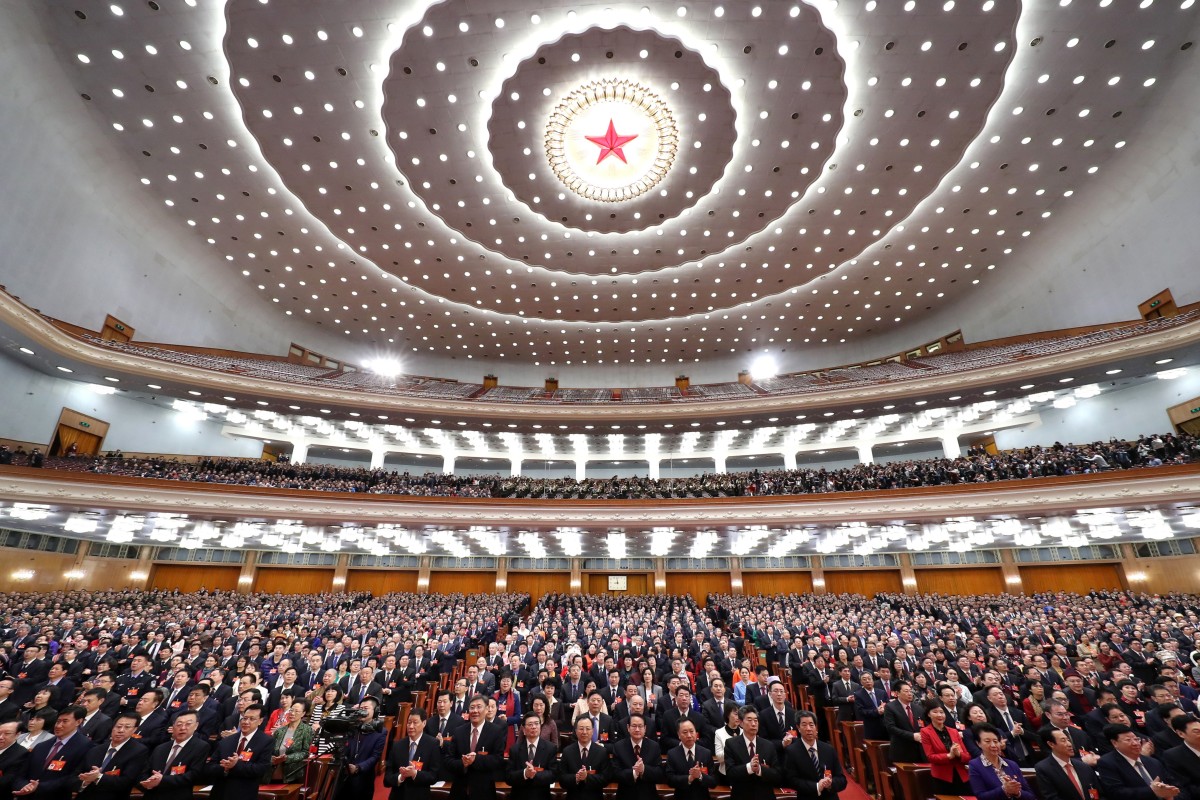China goes through a charade every year in which they convene a National Congress in the Great Hall of the People. This fiction pretends to consider “laws” and enacts them. This is an impressive building, no?
It is worth noting they have no desks, no? How can you work without a desk? [Asking for a friend.]

This year, they enacted a new Foreign Investment Law to take the place of three prior laws:
1. The Law on Sino-Foreign Equity Joint Ventures;
2. the Law on Sino-Foreign Contractual Joint Ventures; and,
3. the Law on Foreign-Capital Enterprises.
These “laws” were passed in the 1979-1990 time period, so they were overdue for an update. They, of course, had no impact on reality.
The new Law on Foreign Investment responds to the concern articulated by companies doing business in China regarding Chinese theft of intellectual property, amongst other issues. In a left handed way, it acknowledges the mischief and tomfoolery thereby contradicting the central government which says, “What? China is stealing intellectual property? No way.”
The United States – China Trade War
Since President Trump took office, the US has been confronting China on its trade practices with three areas of particular interest:
1. Currency manipulation by which China artificially sets currency exchange rates to drive (increase) exports;
2. Theft of intellectual property by the structural requirement for American companies to take on Chinese joint venture partners whether they want them or not (forced technology transfer, theft of secrets); and,
3. Unfair hurdles to American companies trying to sell goods and services in China (market access).
President Trump has done the most important thing — he has “jawboned” the subject meaning he has spoken of it publicly and castigated the Chinese for their unfair practices. No predecessor had ever done that.
The United States has enacted trade tariffs on China — have you noticed any personal impact of these tariffs? I have not.
The President has confronted the Chinese President Xi on every occasion as to these subjects. Meanwhile, the Trump admin is negotiating furiously with the Chinese to strike a deal that accommodates these concerns.
Jawboning, Big Red Car?
Yes, dear reader, the first act between nations in the Kabuki dance of diplomacy and trade talks is for their leaders to talk, even about unpleasant, contentious subjects. When the other party doesn’t want to talk and our irrepressible President does, he speaks out. He jawbones.
You have seen him playing golf with President Xi at Mar-a-Lago and then jawboning on the steps of the clubhouse or at the tee box, no? Jawboning.
President Trump is a hugely effective jawboner.
1. President Trump has jawboned the NATO members to increase their defense spending — solely within the four corners of the actual charter they all signed. Bingo! NATO increased spending.
At the time, the NATO countries were appalled that the American President would demand they keep their end of the deal. Of course, the NATO agreement requires the USA to come to their defense. The least they could do is pay their fair share, no?
This had been going on for decades, but no American President had mentioned it — so declasse to talk about money.
2. President Trump has jawboned North Korea and the horrid little toad who leads it to stop with the obnoxious missile tests. While the NKs are not busily at work denuclearizing, they have stopped their testing of both weapons and missiles.
In addition, the tension on the Korean peninsula, with China, and with Japan is reduced.
American Presidents, since 1953, have been getting rolled by North Korea on a regular basis. President Trump threatened to nuke them.
We are a long way from resolving this issue, but we are in contact and remember the tests.
3. President Trump has jawboned the Chinese to address the problems enumerated above. The Chinese approved their new Foreign Investment Law.
There are a few more examples I could shine light upon, but you get the idea. I like that about you. You are a very quick study.
So, here’s to jawboning, a smart diplomatic skill.
The new China Foreign Investment Law
The democratic (my keyboard almost couldn’t type that word) Chinese National People’s Congress, meeting in their Great Hall of the People in Beijing, approved the new law by a vote of:
2,929 lawmakers FOR the law;
8 lawmakers OPPOSED to the law; and,
8 lawmakers ABSTAINED from voting.
Isn’t democracy, even Chinese democracy, a wonderful thing? Don’t you love a competitive vote?
The law in Article 22 — there are 41 articles — imposes criminal penalties for those who share sensitive foreign information, engage in counterfeiting, and violate intellectual property security.
It has all the right words, but does it really mean anything? Your Big Red Car upon careful introspection says, “No. Do you believe in the Easter Bunny?”
One of the giveaways that this is a head fake is that the Chinese didn’t bother to consult with the American Chamber of Commerce in China, the primary representative of American companies in China.
To enforce such a law, China will require an independent judicial system working in tandem with a powerful law enforcement mechanism, two institutions that cannot co-exist with an authoritarian Chinese Communist Party. Sorry.
So, yes, law on the books. No, it will not be enforced. Sorry.
First steps
What this is, dear reader, is a good first step. It acknowledges the reality of the currency manipulation, cheating, forced tech transfer, and market access issues. To repeat myself — good first step.
Why did any of this happen? Jawboning.
Thanks, Trump.
But, hey, what the Hell do I really know anyway? I’m just a Big Red Car. Great day to you.![]()
